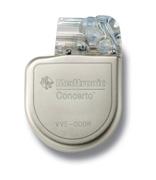
November 15, 2010 – Data from the RAFT clinical trial show that cardiac resynchronization therapy-defibrillators (CRT-Ds) significantly reduced mortality for mildly symptomatic heart failure patients. The trial looked at Medtronic CRT-Ds.
When compared to patients treated with guideline-recommended implantable cardioverter defibrillators (ICDs) and medical therapy, the company’s CRT-Ds reduced mortality by 29 percent.
“These landmark findings demonstrate that earlier intervention with CRT-D, in addition to guideline-recommended medical and ICD therapy, saves lives in this patient population,” said Anthony Tang, M.D., RAFT principal investigator, professor of medicine at the University of British Columbia and adjunct professor of medicine at the University of Ottawa Heart Institute in Ottawa, Canada. “Even for patients without major restrictions from their heart failure, CRT has been shown to slow the progression of their disease and reduce heart failure hospitalizations.”
Cardiac resynchronization therapy reduces heart failure symptoms as well as hospitalizations and mortality for some patients with moderate to severe heart failure. The RAFT trial investigated whether patients with mild to moderate heart failure could benefit from cardiac resynchronization therapy in conjunction with ICD and medical therapy. Both the mortality alone and the combined mortality and heart failure hospitalization endpoints for all patients in the study were reduced by 25 percent.
“This Medtronic-supported research is the first to show the significant lifesaving value of CRT-D for mildly symptomatic heart failure patients and builds upon the growing body of evidence calling for guideline changes,” said Pat Mackin, president of the Cardiac Rhythm Disease Management business and senior vice president at Medtronic. “Our goal is to ensure heart failure patients who could benefit from our therapies are able to receive them.”
More than 22 million people worldwide have heart failure, a condition in which the heart cannot adequately pump blood through the body. Additionally, heart failure is the most costly cardiovascular disease in the United States, costing nearly $40 billion per year.
The Medtronic CRT devices are investigational only and not approved for use in the United States.
For more information: www.medtronic.com


 January 05, 2026
January 05, 2026 









